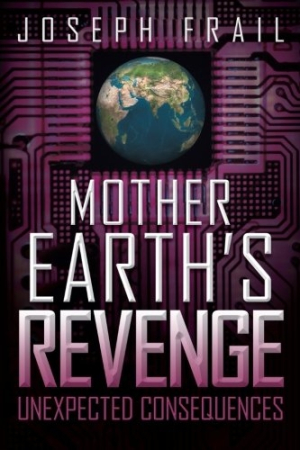Mother Earth's Revenge
Unexpected Consequences
The Earth is alive—and not very happy about environmental changes, with consequences for humans and animals.
The premise of Mother Earth’s Revenge: Unexpected Consequences—that the planet responds to neglect and abuse by dramatically changing the way animals, plants, and humans interact with one another—is intriguing, and Joseph Frail pursues this scenario from a variety of perspectives, including that of Mother Earth herself.
Readers hear from the Earth, the Galaxy News Corporation, and an omniscient third-person narrator in the opening pages before beginning to settle down with William Goodman and his family. Things in Springdale, Missouri, have gotten a little odd for William, his wife, Carolyn, and their brood, who experience profound changes in perception. Animal telepathy and accelerated child development are suddenly the new normal for the Goodmans and their neighborhood. It’s as if they are “all connected by an internal data link,” writes Frail.
This data link is part of the “enlightenment” that is meant to change the way humans live on the planet. Peace and harmony are the ultimate goals, but it’s not clear exactly how the enlightenment is supposed to achieve these ends. Frail writes repeatedly about the planet’s problems—war, crime, corruption, environmental degradation—but never really settles on a solution.
Frequent perspective changes continue throughout the book, with visits to leaders of anarchic governments, tribes suffering in the depleted rain forest, and marine biologists tracking strange whale behavior out at sea. The narrative returns at brief intervals to William’s more domestic concerns. While the larger issues are compelling, the book strays into manifesto territory often enough to make it easy to lose track of the more personal and engaging story of one family’s experience. Each time readers start to get to know the characters—wondering, for instance, how four-year-old Craig has suddenly come to understand algebra, and what kind of messages his older sister Rachael is getting in her dreams—it lasts only a few pages before the novel continues with political ideology.
Some commentary is no doubt needed because Frail puts forth unusual ideas, like technology that allows for interplanetary transmission of sensory experiences including sight, sound, and touch. Frail’s vision, however, loses impact with the repetition of overly dramatic and awkwardly phrased declarations like this: “The essence of man is contrary to the change of his own. If an idea or action doesn’t fit in the realm of what one understands in their comprehension of the matter, he or she shuns the matter.” Grammatical problems, like mid-sentence tense and perspective changes, along with an uneven application of punctuation, make it a challenge to stick with the author’s somewhat murky message to the end.
Filled with intriguing near-future scenarios, Mother Earth’s Revenge suggests possibilities for Earth’s future without exploring any particular scenario to its full extent. Frail puts forth a number of interesting ideas, but his speech-making style is perhaps more suited to nonfiction than storytelling.
Reviewed by
Sheila M. Trask
Disclosure: This article is not an endorsement, but a review. The publisher of this book provided free copies of the book and paid a small fee to have their book reviewed by a professional reviewer. Foreword Reviews and Clarion Reviews make no guarantee that the publisher will receive a positive review. Foreword Magazine, Inc. is disclosing this in accordance with the Federal Trade Commission’s 16 CFR, Part 255.

